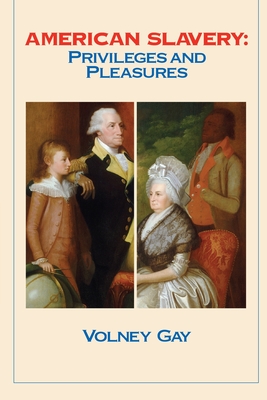American Slavery: Privileges and Pleasures

American Slavery: Privileges and Pleasures
The real reason Americans owned slaves was not just financial. They did it because they liked it.
For the first two centuries of American history, starting with the colonists, slavery was a part of the social, economic, and governmental order. Looking back, many of us find it more comfortable to view slave owners as evil or sociopathic. The startling truth is that many were otherwise admirable.
To understand America's struggles with race relations, we must take an uncensored look at our country's involvement with slavery. We examine three questions:
- What were the pleasures of owning slaves?
- How did freedom-loving, American Christians explain ownership to themselves?
- How did they defend themselves against this double contradiction?
Answering those questions will help us face our future with greater clarity.
From the Preface to On The Pleasures of Owning Persons: The Hidden Face of American Slavery:
This book is a study of the pleasures that slavery gives to owners. This is a demanding, if not an unfathomable topic that rests upon a simple, self-evident truth. The unfathomable part is because slavery seems remote from us now in the 21st century we struggle to imagine its workings from the 16th to the 19th centuries. The self-evident truth is that millions of Americans, over a span of nearly four centuries, owned slaves because they wished to. They actively chose and maintained a way of life which they felt merited protection and permanency. A small number of these people were sociopathic, most likely between 2 and 4 percent, the usual norm for large populations.[i] Most were not. Indeed, outstanding persons, among them undoubted geniuses like Thomas Jefferson, engaged in slavery all their lives. It is difficult to understand sociopathic persons, but the vast majority of owners were like you and me, normal. Great men who laid the foundations of American freedom defended to their graves the institution of slavery. This book addresses three questions: what were these pleasures; how did freedom-loving, American Christians explain ownership to themselves; how did they defend themselves against this double contradiction?
[i] Buckels, Erin E., Paul D. Trapnell, and Delroy L. Paulhus. "Trolls just want to have fun." Personality and individual Differences 67 (2014): 97-102. They conclude, "Thus cyber-trolling appears to be an Internet manifestation of everyday sadism" p. 97.
217.00Lei
217.00Lei
Livrare in 2-4 saptamani
Descrierea produsului
The real reason Americans owned slaves was not just financial. They did it because they liked it.
For the first two centuries of American history, starting with the colonists, slavery was a part of the social, economic, and governmental order. Looking back, many of us find it more comfortable to view slave owners as evil or sociopathic. The startling truth is that many were otherwise admirable.
To understand America's struggles with race relations, we must take an uncensored look at our country's involvement with slavery. We examine three questions:
- What were the pleasures of owning slaves?
- How did freedom-loving, American Christians explain ownership to themselves?
- How did they defend themselves against this double contradiction?
Answering those questions will help us face our future with greater clarity.
From the Preface to On The Pleasures of Owning Persons: The Hidden Face of American Slavery:
This book is a study of the pleasures that slavery gives to owners. This is a demanding, if not an unfathomable topic that rests upon a simple, self-evident truth. The unfathomable part is because slavery seems remote from us now in the 21st century we struggle to imagine its workings from the 16th to the 19th centuries. The self-evident truth is that millions of Americans, over a span of nearly four centuries, owned slaves because they wished to. They actively chose and maintained a way of life which they felt merited protection and permanency. A small number of these people were sociopathic, most likely between 2 and 4 percent, the usual norm for large populations.[i] Most were not. Indeed, outstanding persons, among them undoubted geniuses like Thomas Jefferson, engaged in slavery all their lives. It is difficult to understand sociopathic persons, but the vast majority of owners were like you and me, normal. Great men who laid the foundations of American freedom defended to their graves the institution of slavery. This book addresses three questions: what were these pleasures; how did freedom-loving, American Christians explain ownership to themselves; how did they defend themselves against this double contradiction?
[i] Buckels, Erin E., Paul D. Trapnell, and Delroy L. Paulhus. "Trolls just want to have fun." Personality and individual Differences 67 (2014): 97-102. They conclude, "Thus cyber-trolling appears to be an Internet manifestation of everyday sadism" p. 97.
Detaliile produsului










